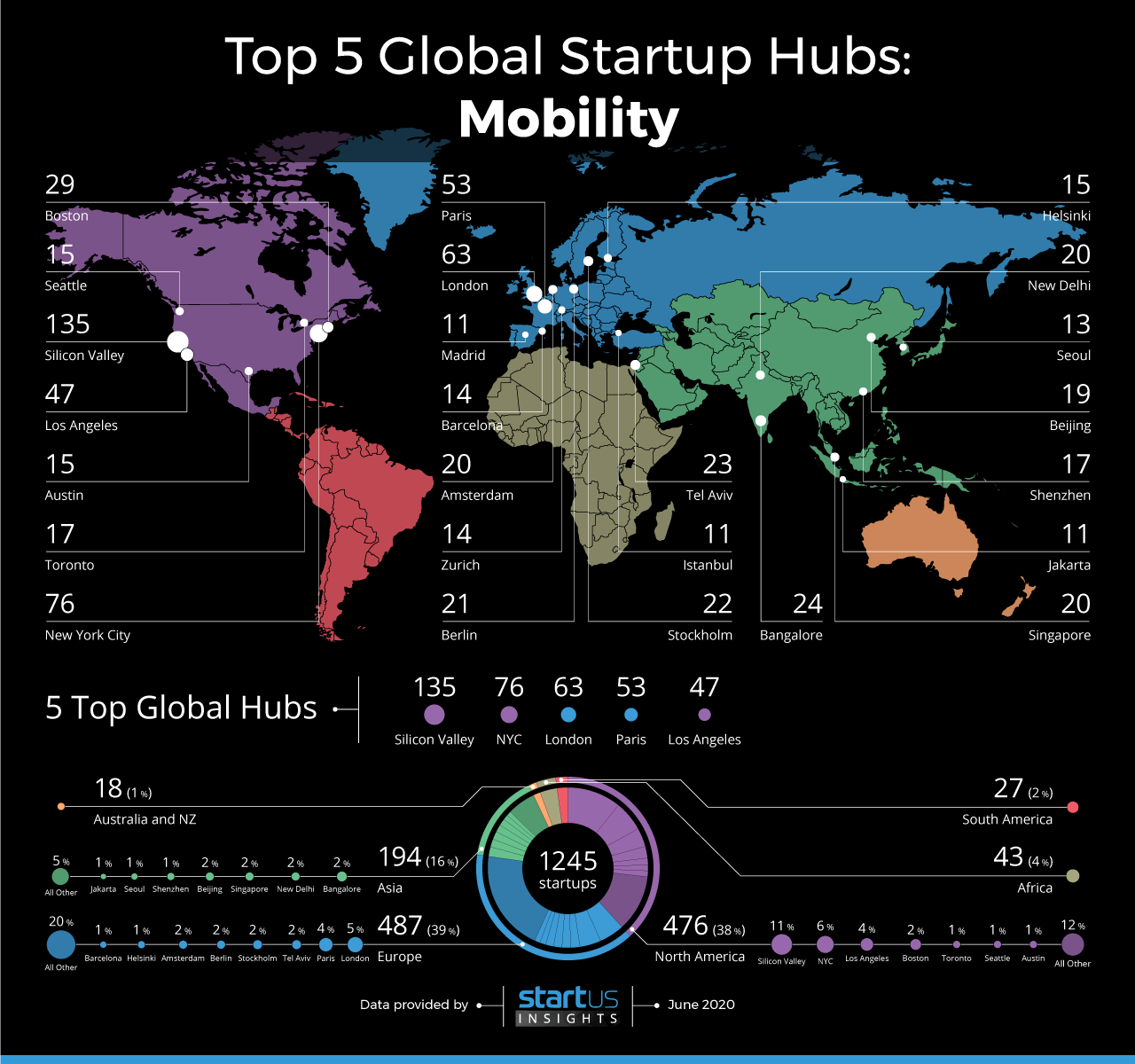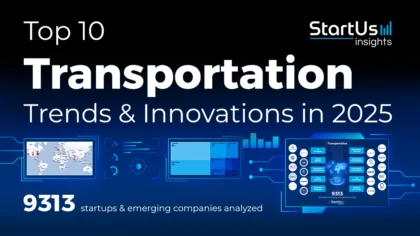Accelerate Productivity in 2025
Reignite Growth Despite the Global Slowdown
You have probably heard of acronyms like ASEM and CASE in relation to the future of mobility and transportation. They refer to the main technologies and business models that propel the mobility sector: autonomous, shared, electric, multimodal, and connected mobility solutions that form the fundamental aspects of where innovation is leading the industry. Some of the main challenges facing the future of transportation involve infrastructure and policy support from local and national government along with scalable and cost-effective product development to encourage mobility startups to enter the industry.
Top 5 Global Startup Hubs: Mobility
Using our StartUs Insights Platform, we analyzed the geographic distribution of global activity in smart mobility. We identified 37 regional hubs* that observe high activity in developing technology-driven solutions across the industry like artificial intelligence (AI), urban mobility solutions, and shared mobility solutions, to name a few.
Within the hubs, we analyzed a sample of 1.245 startups and emerging companies employing technology-driven solutions to innovate in the industry. Silicon Valley, New York City, London, Paris, and Los Angeles are home to 374 startups and emerging companies* and account for 30% of global mobility activity. Let us have a look at some of the innovative solutions from these 5 top hubs.
Based on our sample of 1.245 startups, we observe European cities leading innovation in mobility from Dublin to Istanbul. Together with North America, almost three-fourths of all activity occurs in these hubs. Asian hubs are slowly on the rise as well with massive cities in China and India, along with several Asian metropolitan cities, seeing more than 15% of startup activity.
The same remains true for cities across regions in Africa, Australia & New Zealand, and South America, with its bigger cities already experimenting with transportation and mobility solutions.
1. Silicon Valley: 135 Startups
Many big technology companies operate massive facilities in Silicon Valley. Some of them already employ some form of shared mobility within their campus. Further, startups are looking beyond these safer spaces to experiment and implement innovative solutions across the region. With benefits ranging from lower air pollution and a population that is ready to take up new ways of travel, expect Silicon Valley to provide sustainable mobility solutions, for both the environment and business.
Mountain View-based startup Smartcar develops a suite of application programming interface (API) solutions for mobility companies and their users. The API connects to a variety of car data points such as the odometer, the fuel tank or electric vehicle (EV) battery, and location. In addition, the Smartcar Platform and Connect tools provide APIs and software development kits (SDKs) along with testing and batch requests for product development.
2. New York City: 76 Startups
A recent New York City government mobility report shows that average bus speeds are at its lowest mainly because ridership and the number of for-hire vehicles in the city are both growing. The key focus for the city is to reduce traffic congestion and improve the efficiency of transit. This provides several opportunities for startups to help automotive manufacturers, transportation providers, mobility companies, and regulators.
New York City-based mobility startup Helbiz provides urban transit solutions as well as mobility analytics services. Their HelbizGo and HelbizBike offer the public first and last-mile transit, in turn, reducing the number of people taking their cars out every day. The Helbiz mobility analytics platform visualizes aggregated trip data using modern geospatial tools. This supports operations teams, city planners, and data scientists to make informed decisions around a city’s infrastructure and transportation framework.
3. London: 63 Startups
The city of London is upgrading its urban mobility and transportation services from multiple angles. From installing thousands of EV charging points and operating electric bus fleets to zoning new housing regions with new mobility solutions and integrating the multimodal transit options, it’s all happening in London. This provides numerous opportunities for emerging companies to develop innovative mobility solutions.
Karhoo is a London-based startup offering mobility as a service (MaaS) solutions for various stakeholders. For public transportation, their Karhoo Pool is a white-label mobile application offering an innovative booking experience, available in several languages for passengers, that enables booking, tracking, and information dispensing. In addition, they offer back-office support that allows real-time vehicle tracking, route optimization, and alerts for maintenance, among others.
4. Paris: 53 Startups
The Greater Paris region is also focusing on wide-ranging development of mobility solutions, from large-scale projects to future mobility like eVTOLs and urban water transportation solutions. The city imposes car-free days that allow for higher adoption of urban transit. With a focus on reducing carbon dioxide emissions, Paris is also planning to build a multimodal logistics and passenger hub that will coordinate and distribute the various modes of transport.
Operating from Montigny-le-Bretonneux, around 30 km south-west of Paris, Gyrolift is a mobility startup developing an innovative sit or stand mobility solution. Potential applications range from the human workforce spending their entire day walking or standing at different locations inside a warehouse or factory to acting as a support for rehabilitation post-injury or stress. Similar facility-wide mobility solutions have significant benefits in the long term health and well being of factory workers.
5. Los Angeles: 47 Startups
The Los Angeles City Council has adopted the Mobility 2035 plan, by when it aims to have the necessary pieces together. This includes improving the safety of transit, the quality of infrastructure, access to all members of the city, and environmental targets, all to help LA residents make informed travel choices. The second-largest city in the US is pushing for changes across transportation systems, providing several opportunities for mobility and digital technology startups.
Operating from El Segundo, Automotus provides parking and mobility solutions. Its suite of curbside management solutions includes the Atlas analytics platform that considers curb and street activity across ride-hailing, delivery, passenger vehicles, buses, e-scooters, bikes, and pedestrians. In addition, the startup also offers automated commercial payments for invoicing companies for their curb usage to ensure freight, ride-hailing, and food delivery vehicles. Their solutions help reduce road congestion by improving curbside productivity.
What’s Next?
Every local region is best suited for certain types of mobility solutions. One solution to solve all transport-related issues is unlikely, leaving ample opportunity for localized innovation. As autonomous vehicles, shared mobility services along with multimodal transit gain popular support, emerging mobility startups will also innovate at various levels from solving traffic congestion to reducing the carbon footprint of human travel.
*We define a hub as the regional geographic center of activity for this topic. It covers the center point with a radius of 100km. We define startups as those founded after 2015.








